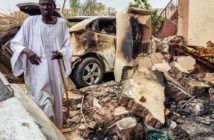Are Bashar al-Assad and the Syrian regime winning the game of chess that began nearly five years ago under the sun of the Sham? Is there still something to expect from the Free Syrian Army and the Syrian revolution? Has the Islamic State already lost the war? And which part will the Kurdish factions play in the concert that has become a bit less cacophonic?
The façade of the theatre has changed… The West has lost the initiative and the European press may try to keep up its “Putin-bashing”, which has become an obsession since the re-emergence of the cold war with the Ukraine crisis. It can repeat that “more than a thousand civilians have been killed by Russian strikes in Syria… according to the SOHR” (the Syrian Observatory of Human Rights, a misty organisation that had drowned the media with fabricated lies since the beginning of the conflict, nonetheless cited again and again by the incompetent journalistic mob, a more than doubtful “source” that seemed to have been pushed back into the hangar of “everyone can make mistakes”, but that is coming back to editorials today like a pest). Even this journalism cannot stop Moscow’s policy from bearing its fruit and the regular Syrian army from imposing itself nearly everywhere, even against the Islamic State.
The regular Syrian army is for Moscow what the International Coalition led by the USA is lacking: an on-site intervention force, well-equipped and determined, able to coordinate action with massive aerial support. The air strikes on their own do not suffice to dismantle and destroy the Jihadist brigades, but just about to bring them to a hold or perhaps push them back for a few miles, from where they can be pushed further back by local militia.
Perfectly aligned, one with the other, the Syrian army and the Russian air force have obtained convincing results since the launch of operations at the end of December 2015: the regions of Latakiah, of Idlib, now even of Aleppo, are one after the other progressively reconquered by the regime, which slowly but seemingly surely regains its control over the country.
If the Russian air strikes against all enemies of Bashar al-Assad (and not only against the Islamic State) weaken the resistance to Jihadists (since the Syrian opposition also fights against the IS), by ridding the regular Syrian army of secondary combats that distract it from major objectives and require troops, these air strikes allow the reconfiguration of the ground frontline to be more efficient against “Daesh”.
A restructuration of military operations, orchestrated by Moscow and Damascus, en route since five months, against the Islamic State and much to the annoyance of Ankara, implying in a more and more obvious way the Kurdish militias of the PKK (or more precisely, those of their Syrian avatars, the squadrons of the YPG)…. To be continued.
In the meantime, the Caliphate should not be sunk into its grave too quickly. It is still actively supported by Turkey, who makes colossal profits from the petrol collaboration in these circumstances. Turkey also increasingly plays the Jihadist card against the Kurds in Syria; they find themselves increasingly inclined to abandon their revolutionary velleities and may, at the end of the day, find an agreement with Damascus towards a form of regional autonomy (which the President al-Assad seems entirely happy to grant them, for the moment… though it is also true that alliances are quickly made, undone and incessantly recomposed in the Middle East; one day perhaps, Erdogan and al-Assad may be shaking hands again).
The Islamic State does not only exist on Syrian and Iraqi soil, where, of course, it seems less at ease than previously the case. The Islamic State is also the threat of attacks, gradually more mastered and coordinated, in the countries of the different coalitions that fight it in the regions where it is territorially anchored. Attacks that are more and more complex, that will inevitable multiply as the Islamic State keeps on recruiting in the West, in the Caucasus, and elsewhere…
Moreover, in Syria and Iraq the retreat of the Caliphate has mainly concerned the territories that were strongly claimed by the Kurdish militias, especially in Syria, and in Iraq in those zones, where the Jihadists had only superficially settled down due to the lacking support of the local populations, partly Shi’ites. No illusions should be made as to those Sunni villages that are unconditionally loyal to the Islamic State and will not let themselves be conquered by armies strengthened by militias of the Hezbollah or by Shi’ites from Baghdad, whose prime regional supporter is Iran.
However, all that being said, it is towards the first and main symbol of the Syrian revolution that everyone turns to at the current time, there where the Free Syrian Army dies in combat, a tragic hour upon which a page of this history is turned: the ruins of Aleppo… which some had nearly forgotten.



